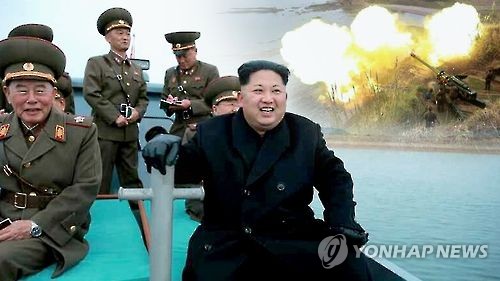- California Assembly OKs highest minimum wage in nation
- S. Korea unveils first graphic cigarette warnings
- US joins with South Korea, Japan in bid to deter North Korea
- LPGA golfer Chun In-gee finally back in action
- S. Korea won’t be top seed in final World Cup qualification round
- US men’s soccer misses 2nd straight Olympics
- US back on track in qualifying with 4-0 win over Guatemala
- High-intensity workout injuries spawn cottage industry
- CDC expands range of Zika mosquitoes into parts of Northeast
- Who knew? ‘The Walking Dead’ is helping families connect
Experts call on Trump to engage N. Korea
SEOUL, Nov. 11 (Yonhap) — “Engagement” will be the most viable option for the new U.S. government to make North Korea give up its nuclear and missile programs, three experts said Friday.
A forum in Seoul called on the Donald Trump administration that begins in January to seek dialogue-based engagement policies toward a nuclear-armed North Korea.
Ken E. Gause, director of the International Affairs Group at the Center for Naval Analyses, outlined possible policy options for the incoming Trump administration — pre-emption, intensified sanctions and engagement — as President Obama’s “strategic patience” approach is widely received as a failure.
He proposed the new government give priority to engagement involving both dialogue and pressure, citing the potentially catastrophic downsides of pre-emptive attacks and the ineffectiveness of stronger sanctions heavily reliant on China.
“It is an option, however, that will require many years, if not decades, to achieve,” Gause said.
“The (engagement) option is the least appealing to the U.S. and South Korean policymakers. It is tainted by the history of past policies of appeasement. It smacks of rewarding bad behavior and giving Pyongyang de facto recognition as a nuclear state, something the United States and South Korea have said they will never do,” Gause said.
But it is an option that has yet to be seriously tried in the Kim Jong-un era. That’s because his regime has laid out “a possible quid pro quo in terms of a freeze on the nuclear program in return for concessions on joint Washington-Seoul exercises. A freeze and inspections might be a viable short-term goal,” he added.

This undated captured image from Yonhap News TV shows North Korean leader Kim Jong-un and his officials during a field visit to a military drill in the West Sea.
Chun Chae-sung, who teaches political science at Seoul National University, said durable peace will be possible if South Korea guarantees the survival of a denuclearized North Korea and pursues engagement with the North.
The view was also echoed by Georgy Toloraya, director of the Asian strategy Center at the Institute of Economics of the Russian Academy of Sciences.
“The economy (in North Korea) is not in crisis. Sanctions have so far had little effect. Move away from sanctions and pressure to engagement, negotiations and compromise seeking deterrence based on broad cooperation with international actors and recognizing their interests,” Toloraya said.
This year alone, the communist country conducted two nuclear tests following detonations of nuclear devices in 2006, 2009 and 2013. Defying international condemnation and sanctions, it has also test-fired more than 20 ballistic missiles so far this year.








![일본 사도광산 [서경덕 교수 제공. 재판매 및 DB 금지]](http://www.koreatimesus.com/wp-content/uploads/2024/07/PYH2024072610800050400_P4-copy-120x134.jpg)


